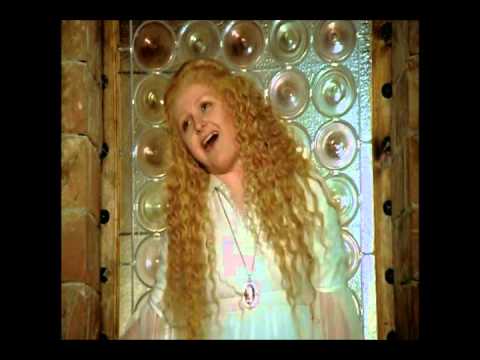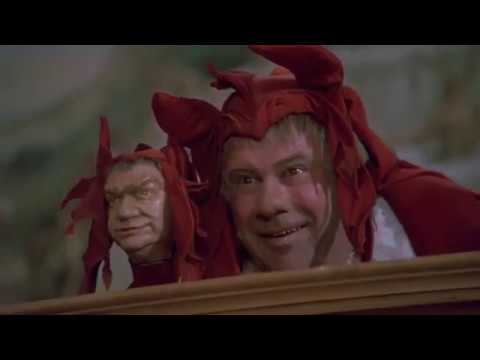|
SATURDEE OPRY LINKS 41: "Rigoletto"
Special!
 
Edita Gruberova as Gilda
Ingvar Wixell as Rigoletto
Saturdee Opry Links Overture!
"Rigoletto," by Verdi.
https://www.youtube.com/watch?v=WY_mrgd_Nqc
1.
To start things off with a bang, here is an
astounding live performance by Jussi Bjorling in 1945 of "La Donne e Mobile"
from "Rigoletto," by Verdi. Get this: at a recent "Rigoletto" by L.A. Opera, the
conductor apologized---apologized----for the content of "La Donne e Mobile." He
said it might upset the "metoo" folk. I kid not. Never mind that this aria is a
lighthearted romp by a jolly lothario, the Duke of Mantua. This society is now
officially meowing without a cat.
https://www.youtube.com/watch?v=Pmg_nbxZMbQ
Setting: The inn of Sparafucile
Synopsis: The Duke, disguised as a soldier, sings that all women are fickle and
that they will betray anyone who falls in love with them.
Translation:
https://en.wikipedia.org/wiki/La_donna_%C3%A8_mobile
2.
"Rigoletto" is based on a story by Victor Hugo, "Le Roi s'amuse,"
and was Verdi's great breakthrough as a dramatist. For the first time, his
strengths at storytelling merged equally with his strengths as a composer. This
is one of what is referred to as the great middle-period trilogy of Verdi
operas, the others being "La Traviata" and "Il Trovatore." But enough scholarly flapdoodle. It's a damn good
story, Shakespearian in scope---and also. . .damned weird. You got this hunchbacked court jester, see (Rigoletto),
and he has a secret daughter whom he adores beyond comprehension, see---so much
so that he protects her from "the world," meaning the court, see, and especially, the
Duke. This would be Gilda, if you're keeping score at home. Of course, the
busybody courtiers---forever miffed at Rigoletto's jests about them---discover
the daughter, but assume she is Rigoletto's mistress! Huh? And just for "fun," they
decide to kidnap her! You know, just to rile the old hunchback up, to get his
back up (so to speak), and pay him back for all the nasty jesting. But I'm
getting ahead of myself. Here, in the aria (or quasi-duet), "Figlia, Mio Padre,"
Gilda asks her father about her long-dead mother. This constitutes part of the
autobiographical element that makes "Rigoletto" all the more involving,
affecting. You see, Verdi, in an unimaginable tragedy, lost his wife and two
young children to encephalitis. The soprano is Edita Gruberova, the baritone is
Ingvar Wixell. With English subtitles.
https://www.youtube.com/watch?v=VsPIu1BSoaE
3.
Warning! Titties! (That should get somebody to watch this goddamn thing.) Okay,
kids, why is poor Rigoletto so cursed? Isn't it enough that he is a hunchback who
tells jokes for a living? No! Not in the world of opera! Rigoletto must be
formally cursed, and in this case by the elderly Count Monterone. What's the
Count's beef? Well, it isn't the Count's beef that's at issue---it's the Duke's,
so to speak. The randy Duke has seduced the Count's daughter! Monterone
confronts the Duke, only to be arrested---and then to be mocked by Rigoletto,
never mind that his job is. . .mockery! Well, the old Count doesn't care for
this, and puts a great big curse on Rig. Here is that scene, complete with. . .titties!
And bass-baritone Alexey Yakimov.
https://www.youtube.com/watch?v=X6zkSM-oCxw
TRANSLATION:
http://www.opera-arias.com/verdi/rigoletto/chio-gli-parli/
4.
Poor Gilda, such a naif, so pure---irresistable to the likes of the libidinous
Duke. Of course, it's a bit ambiguous, the way Verdi tells it. Is the Duke
really an uncaring womanizing scoundrel? Or does he actually fall in love (or at
least infatuation) with every pretty woman he meets? Who is the victim here?
Anyhow, Gilda has sneaked out behind Pop's back, so to speak, and it didn't take
long for Dukey to swan in and make her swoon. Here the pair swear their love for
one another in the lovely exchange marked by the Duke's aria, "E il sol
dell'anima," or "Love is the sunshine of the soul." The aria begins at about
2:38, performed by Marcelo Alvarez and Christine Schaefer for the Royal Opera of
London. This segues into a protracted goodbye sequence that Laurel and Hardy
would have appreciated. (See link below) Gilda, fearing that the cap and bells
of Rigoletto are at hand, sends the Duke on his way, with more "Addio's" than
you can shake a stick at. Why you'd want to do that, I don't know. (Well, you
remember how hard it was to say goodnight, back in your dating days, don't you?)
Oh, by the way, the Duke gave Gilda a fake name, that naughty boy, claiming to
be a starving student named Gualtier Malde. Deceitful? Or noble of him to not impress her with
his title?
https://www.youtube.com/watch?v=I8yX8QwICMg
Translation:
http://www.opera-arias.com/verdi/rigoletto/e-il-sol-dell%27anima /
Laurel and Hardy say goodbye:
https://www.youtube.com/watch?v=wlVu7Y5m5JQ
5.
Smitten, besotted, enraptured, possessed, captivated, and otherwise nuts about
the Duke, er, that is, Gautier Malde, Gilda here sings of her insanity, I mean
love---in one of the great, beautiful arias in all opera, "Caro Nome." Here,
again, is Edita Gruberova. English subtitles.
https://www.youtube.com/watch?v=CnabxcCq088
Setting: The house of Rigoletto
Synopsis: After the Duke in the guise of a poor student named Gualtier Malde has
seduced her, Gilda sings of her new-found love.
And, for unfair comparison, is Maria Callas:
https://www.youtube.com/watch?v=WT92QQyRfT0
https://www.youtube.com/watch?v=wrqXsdq5sog
Our SOL "Rigoletto" special continues, despite popular demand!
6.
As I was saying earlier, the courtiers kidnap Gilda as payback to Rigoletto for
all his insults. (Again, never mind that his job is to tell jokes, and "keep
people honest," as is the craft of all jesters.) Of course, the courtiers think
Gilda is Rigoletto's secret mistress, not his daughter. Finding her gone, the
Duke---that womanizing menace to the "metoo" movement (according to enfant
terrible LA Opera conductor Matthew Aucoin!)---erupts in despair. yes, despair,
in two remarkable arias-in-one, "Ella mi fu rapita!" ("She was stolen from me!")
and "Parmi veder le lagrime" ("I seem to see tears"). This is one of the most
duly famous sequences in all opera. You can feel the wringing hands, the sweat,
the despondency. This is a man not in love? I think not, Mathew Aucoin. A tour-de-force, if
ever there was one. Here is Luciano Pavarotti.
https://www.youtube.com/watch?v=O50YveN3TL0
Translation (wonderful words):
http://www.aria-database.com/search.php?individualAria=264
And for fun, here is Mario Lanza.
https://www.youtube.com/watch?v=NjMUVFbufRY&list=RDNjMUVFbufRY&start_radio=1
And here is a tremendous, Pavarotti-defeating performance of the same by the
rather overlooked great, Alfredo Kraus.
https://www.youtube.com/watch?v=1JpZg5sPQU0
7.
This might be, in its way, the most remarkable moment in "Rigoletto." I will
turn to LA Opera sub conductor Matthew Aucoin's notes for proper explanation.
Get out your pipes and start stroking your chins. This aria is "one of Verdi's
most important musical breakthroughs," and it came "as a result of specific
dramatic necessity." At this point, "Rigoletto is desperately searching for
Gilda, abducted by the Duke's courtiers. In the aria's first section, Rigoletto
rages at them." Predictable and appropriate, right? What's so revolutionary
about that? Just this: "Before long, he sees that his rage will get him nowhere,
and. . .tries a different tack, and so must the music. Mid-aria, Verdi slams on
the brakes and shifts from intense to servile; Rigoletto pleads and cajoles the
courtiers, trying to win sympathy." Finally the hunchbacked jester, broken by
the loss of his daughter, collapses, weeping (5:04 in video.) Yet the music
modulates not to some ultra-dramatic minor key, to express anguish, no---rather,
it shifts into D-flat major, the voice accompanied by cello. (6:00 into the
video.) This is the revolutionary musical device. This surprising change
rendered Rigoletto even more sympathetic, as it replaced musical angst with
beauty, and the beauty all the more poignantly framed the man's heartbreak. Got
that? The proof is in the listening. Here is "Cortigiani, vil razza dannata,"
("Courtiers, vile and cursed kind.") Once again, Ingvar Wixell.
https://www.youtube.com/watch?v=JULs5RoCEgM
Translation:
http://www.aria-database.com/search.php?individualAria=268
For comparison, here is the late, great Dmitri Hvorostovsky.
https://www.youtube.com/watch?v=_OIm3VpXDJs
8.
Rigoletto recovers Gilda. How? The courtiers inform the Duke that they have
kidnapped the jester's mistress. Upon seeing Rigoletto's daughter, the Duke is
delighted, much to the befuddlement of the courtiers. He sets them straight, and
Gilda is released. Soon reunited with his daughter, Rigoletto listens to her
tale of having fallen in love---with the Duke. She sings gloriously of her love,
"Tutte le feste al tempio" ("On all the blessed days"), and he responds by
threatening revenge against the Duke, with "Sì! Vendetta, tremenda vendetta!"
("Yes! Revenge, terrible revenge!").
Here is that sequence, with English subtitles. Again, Gruberova, Wixell.
https://www.youtube.com/watch?v=JlvmKtMAk64
9.
Warning! Titties! (Again.)
Determined to prove to Gilda that the Duke is a cad, Rigoletto takes her to the
residence of one of his many paramours, Maddalena. There, the jester and his
daughter spy on the Duke and Maddy, and Mantua comes through nicely with
flirtations and declarations of undying love. This gives way to one of the great
quartets in all opera, "Bella Figlia dell'amore," in which the Duke swears love,
Maddalena swears love, Gilda laments the Duke's behavior, and Rigoletto swears
revenge. Here it is, with English subtitles, and Placido Domingo, cornell
Macneil, Illeana Cotrubas, Isola Jones. Way back in 1977, before you were born.
https://www.youtube.com/watch?v=grK-mzR05B8
10.
"Rigoletto" does not end well. Right, what a shocker. In short, the jester hires
an assassin to kill the Duke. In one scene, Maddalena pleads with the assassin
to spare the Duke's life---in the aria, "Ah, piu non ragiono," here sung by
Ileana and her large Cotrubas. (Sorry, ladies, couldn't resist.)
https://www.youtube.com/watch?v=gr9HoqHEj6s
Or here it is, with English subtitles and sanely harnessed breasts. (Victoria
Vergara):
https://www.youtube.com/watch?v=VpXJIjpH2E0
RIGOLETTO SPECIAL FINAL BOW:
To telescope the proceedings, Gilda disquises herself as the Duke and is
murdered instead of him. The things we do for love, etc. At midnight, when
Rigoletto arrives with money to pay the assassin, he receives a corpse wrapped
in a sack, and rejoices that he has rid the world of Il Dukey. Weighting the sack
with stones, he is about to cast it into the river when he hears the voice of
the Duke, sleepily singing a reprise of his "La donna è mobile" aria, in the
distance. Huh? Bewildered, Rigoletto opens the sack and discovers his dying
daughter. For a moment, she revives and declares she is glad to die for her
beloved: "V'ho ingannato" ("Father, I deceived you"). She dies in her father's
arms, Rigoletto crying out in horror: "La maledizione!" ("The curse!")
Paolo Gavanelli and Christine Schafer sing the final duet from a 2002 Covent
Garden performance.
https://www.youtube.com/watch?v=63DoPGKjudk
Translation:
http://www.opera-arias.com/verdi/rigoletto/v%27ho-ingannato-colpevole-fui/
Saturdee Opry Links Rigoletto Special Encore!
As George Harrison once said, "We've forgotten Billy Preston!" Which is to say,
we've omitted the most popular aria in "Rigoletto," possibly the best known aria
in all opera. But of course, I speak of "Questa o Quella," ("This one or That
one"), the Duke's cavalier statement of "philosophy" of women! Here is Luciano.
https://www.youtube.com/watch?v=NWwg_VtrTdg
Translation:
http://www.aria-database.com/translations/rig02_questo.txt
Back to Opera Links
Back to Home Page
|



